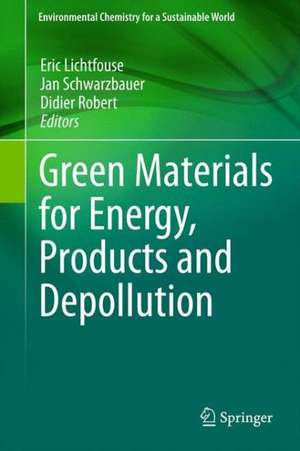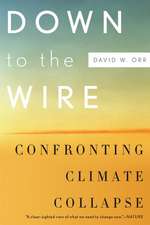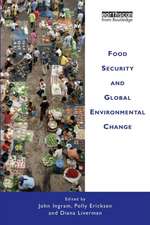Green Materials for Energy, Products and Depollution: Environmental Chemistry for a Sustainable World, cartea 3
Editat de Eric Lichtfouse, Jan Schwarzbauer, Didier Roberten Limba Engleză Hardback – 31 oct 2013
| Toate formatele și edițiile | Preț | Express |
|---|---|---|
| Paperback (1) | 649.87 lei 6-8 săpt. | |
| SPRINGER NETHERLANDS – 23 aug 2016 | 649.87 lei 6-8 săpt. | |
| Hardback (1) | 656.43 lei 6-8 săpt. | |
| SPRINGER NETHERLANDS – 31 oct 2013 | 656.43 lei 6-8 săpt. |
Din seria Environmental Chemistry for a Sustainable World
- 18%
 Preț: 1118.45 lei
Preț: 1118.45 lei - 15%
 Preț: 645.79 lei
Preț: 645.79 lei - 15%
 Preț: 653.14 lei
Preț: 653.14 lei - 15%
 Preț: 648.24 lei
Preț: 648.24 lei - 15%
 Preț: 643.34 lei
Preț: 643.34 lei - 15%
 Preț: 651.51 lei
Preț: 651.51 lei - 15%
 Preț: 646.62 lei
Preț: 646.62 lei - 18%
 Preț: 956.81 lei
Preț: 956.81 lei - 18%
 Preț: 959.98 lei
Preț: 959.98 lei - 15%
 Preț: 646.62 lei
Preț: 646.62 lei - 18%
 Preț: 1389.30 lei
Preț: 1389.30 lei - 18%
 Preț: 1229.10 lei
Preț: 1229.10 lei - 18%
 Preț: 1001.81 lei
Preț: 1001.81 lei - 18%
 Preț: 1118.62 lei
Preț: 1118.62 lei - 18%
 Preț: 899.21 lei
Preț: 899.21 lei - 18%
 Preț: 1120.18 lei
Preț: 1120.18 lei - 18%
 Preț: 896.08 lei
Preț: 896.08 lei - 18%
 Preț: 788.72 lei
Preț: 788.72 lei - 18%
 Preț: 1009.70 lei
Preț: 1009.70 lei - 15%
 Preț: 650.86 lei
Preț: 650.86 lei - 15%
 Preț: 646.62 lei
Preț: 646.62 lei - 18%
 Preț: 1017.62 lei
Preț: 1017.62 lei - 18%
 Preț: 1118.62 lei
Preț: 1118.62 lei - 15%
 Preț: 644.95 lei
Preț: 644.95 lei - 5%
 Preț: 915.58 lei
Preț: 915.58 lei - 24%
 Preț: 751.40 lei
Preț: 751.40 lei - 18%
 Preț: 1008.12 lei
Preț: 1008.12 lei - 18%
 Preț: 1113.89 lei
Preț: 1113.89 lei - 18%
 Preț: 950.52 lei
Preț: 950.52 lei - 18%
 Preț: 959.98 lei
Preț: 959.98 lei - 15%
 Preț: 648.42 lei
Preț: 648.42 lei - 18%
 Preț: 950.96 lei
Preț: 950.96 lei - 23%
 Preț: 852.88 lei
Preț: 852.88 lei - 18%
 Preț: 959.50 lei
Preț: 959.50 lei - 20%
 Preț: 647.13 lei
Preț: 647.13 lei - 24%
 Preț: 744.58 lei
Preț: 744.58 lei - 18%
 Preț: 1215.22 lei
Preț: 1215.22 lei - 20%
 Preț: 570.17 lei
Preț: 570.17 lei - 24%
 Preț: 824.15 lei
Preț: 824.15 lei - 15%
 Preț: 647.59 lei
Preț: 647.59 lei
Preț: 656.43 lei
Preț vechi: 772.26 lei
-15% Nou
Puncte Express: 985
Preț estimativ în valută:
125.60€ • 131.15$ • 103.72£
125.60€ • 131.15$ • 103.72£
Carte tipărită la comandă
Livrare economică 15-29 aprilie
Preluare comenzi: 021 569.72.76
Specificații
ISBN-13: 9789400768352
ISBN-10: 9400768354
Pagini: 340
Ilustrații: XII, 476 p. 110 illus., 23 illus. in color.
Dimensiuni: 155 x 235 x 27 mm
Greutate: 0.86 kg
Ediția:2014
Editura: SPRINGER NETHERLANDS
Colecția Springer
Seria Environmental Chemistry for a Sustainable World
Locul publicării:Dordrecht, Netherlands
ISBN-10: 9400768354
Pagini: 340
Ilustrații: XII, 476 p. 110 illus., 23 illus. in color.
Dimensiuni: 155 x 235 x 27 mm
Greutate: 0.86 kg
Ediția:2014
Editura: SPRINGER NETHERLANDS
Colecția Springer
Seria Environmental Chemistry for a Sustainable World
Locul publicării:Dordrecht, Netherlands
Public țintă
ResearchCuprins
1. Biodiesel from microalgal oil extraction.- 2 . Electrochemistry and water pollution.- 3. Heterogeneous photocatalysis for pharmaceutical wastewater treatment.- 4. Water depollution using ferrites photocatalysts.- 5. Bioindicators of toxic metals.- 6. Natural dyes and antimicrobials for textiles.- 7. Surfactants in agriculture.- 8. Cheap materials to clean heavy metal polluted waters.- 9. Water quality monitoring by aquatic bryophytes.- 10. Halogenated PAH contamination in urban soils.
Notă biografică
Dr. Eric Lichtfouse is Editor of scholarly journals and series in environmental chemistry and agriculture. He is heading publication assistance services and teaching scientific writing in Europe and the USA. He has done research in organic geochemistry, soil carbon dynamics and phytoremediation. Dr. Jan Schwarzbauer is Editor of the journal 'Environmental Earth Sciences ' and Subject Editor of 'Journal of Soils and Sediments'. After studying chemistry at the University of Hamburg, he is working since 1998 at the RWTH Aachen University leading as full professor the group 'Enviromental Organic Geochemistry'. Dr. Didier Robert is professor in organic chemistry and green chemistry at the University Paul Verlaine-Metz (France). He is associate editor of the Journal of Photocatalysis Sciences and its research activities are devoted to the decontamination of air and water by photochemical processes, especially by photocatalysis. He is also editor of the biannual magazine "UniversCity" published by UPV-Metz, dedicated to Cultures and Sciences.
Textul de pe ultima copertă
Using renewable fuels and materials, drinking clean water and food, and breathing safe air are major issues for a sustainable world. This book reviews biodiesel production from microalgae, a promising energy source that does not compete with food production. Several advanced techniques to clean polluted waters, such as electrochemistry, ferrites photocatalysis and low-cost filtration are presented. Chapters also show various living organisms used as bioindicators of toxic metals. Decreasing ecotoxicity of pesticides using suitable surfactants is reviewed. The last chapter evidences new pollutants in urban soils, halogenated polycyclic aromatic hydrocarbons.
Caracteristici
Describes the production of biofuel from microalgae Includes new efficient methods to clean wastewater Reviews natural dyes and antimicrobials for textiles and surfactants in agriculture Discusses electrochemistry and water pollution?










